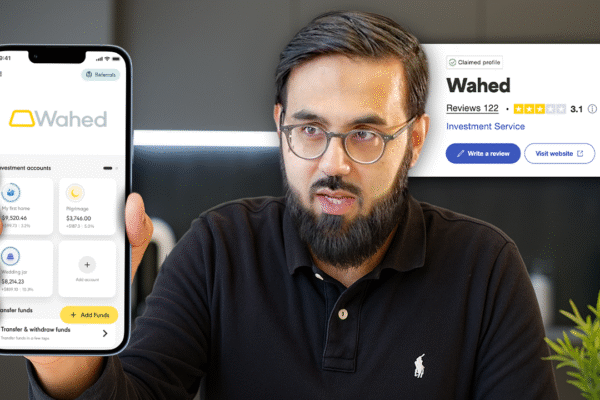
Is the S&P 500 Halal? A Guide for Muslim Investors
26 August 2025 7 min read


Ibrahim Khan
Co-founder
6 min read
Last updated on:
Given the popularity of our previous article on halal investments (exploring forex and shares as an option) we thought it would be useful for our readers to expand on the whole theme of investment and savings and how to go about building a successful Shariah-compliant portfolio.
There are two main things to remember when it comes to building a portfolio. First, there is choosing the correct asset. This involves researching the fundamental case for investment, the risk/reward ratio, liquidity, etc – this tends to be the bit that most people see as the main part of investing and so they don’t overlook this part.
However, there is also a key concept known as portfolio management This is taking a step back and assessing the makeup and risk profile of your portfolio as a whole – assessing if you have diversified sufficiently or not, and thinking about the overall strategy that is guiding all your investment decisions. This is the bit that most people forget.
So, for instance, if your overall ‘pot’ is, say, £50,000, there are lots of way you could divide that money up. You could allocate 50% of it to fixed-income products, 30% of it to equities, and keep 20% as cash. This make-up is by no means good or bad, it’s just an example of starting to think about portfolio management as a whole, and getting used to the idea of ‘splitting up’ your portfolio depending on your risk strategy.
This article is all about looking at this second strand, outlining what a healthy well-balanced, well-diversified portfolio looks like, and then discussing how to achieve that in a Shariah-compliant way.
This is a topic close to my heart right now, as I transition from a single early-twenties guy into a married man looking to start a family. My portfolio right now is very much on the high-risk end of the spectrum, but naturally, I am now reassessing my portfolio in light of my life changes.
What does a well-balanced portfolio look like?
There is a lot of theory that goes into this, and many PhDs have been written on this precise topic but broadly, there are three constituent parts to any portfolio:
Equities are the highest risk, as one always runs the potential of losing everything; fixed income products are much lower risk and offer a fixed return; cash is…well…cash. It’s the safest option out of the three, but the option that makes you lose in the long-run due to effects of inflation devaluing the cash.
I’m going to assume that you’re sensible enough to know what you need to hold in cash in your current account to meet your very short term needs, and we will focus on the first two elements as the sole constituents of your portfolio.
What percentage of my portfolio should I assign to each of these sections?
In the classic text on value investing by Benjamin Graham, “The Intelligent Investor“, he outlines that his portfolio makeup would vary depending on whether or not he thought equities were overpriced or not. When he thought equities were overpriced, he would recommend holding up to 75% of his portfolio in bonds, with just 25% in equities. However, at a time when equities are under-priced he recommended going 75% equities and 25% bonds and cash.
The point is simply that when equities go low-risk, stock up on them as they offer better earnings and capital returns. When they are high-risk (i.e. they might fall very shortly) then sell them and move your money into the much safer, though lower-yielding, bonds market that pays a fixed interest rate. And the way to work out “overpriced” or underpriced”? Read Ben Graham’s book – or any other reputable value investment book.
Hang on – you said “interest rate”. That’s not allowed right?
You’re quite correct. Standard bonds are basically an IOU. You lend the Government/company a £100 and they promise to pay you back that amount after five years, but in the interim they will pay 2% interest a year, for example. Then at the end of the 5 years they also pay back the £100.
This is just a straightforward interest-bearing loan. It’s very low risk and its very predictable. And a good portfolio needs something like this in there.
So is there a Shariah-compliant way of achieving this?
Yes. Here are some options:
However do bear in mind that real estate is not as safe as a savings account – or as low-hassle. You will have to either manage the letting yourself, or give an estate agent a cut to do it for you. You will have to deal with periodic repairs. You will also be exposed to the vagaries of the rental and property market, as well as, of course, the luck of the draw with the kind of tenants you get. You might have to pay the bills, including council tax. Having said all that though, the return is still pretty stable, but it’s not as stable as a bond or a savings account.
Concluding remarks
Please note that the above does not constitute financial advice. You should seek the advice of a qualified, independent financial advisor for a qualified opinion. Never buy shares without conducting sufficient research.
Look forward to all your thoughts below! Also, I realise this is a topic that’ll trigger quite a few questions. Fire away, I’ll give it my best!
Please remember to subscribe to our email list (box on the top right), and follow us on Facebook and Twitter.

26 August 2025 7 min read

24 July 2025 15 min read

16 July 2025 5 min read
Leave a Reply